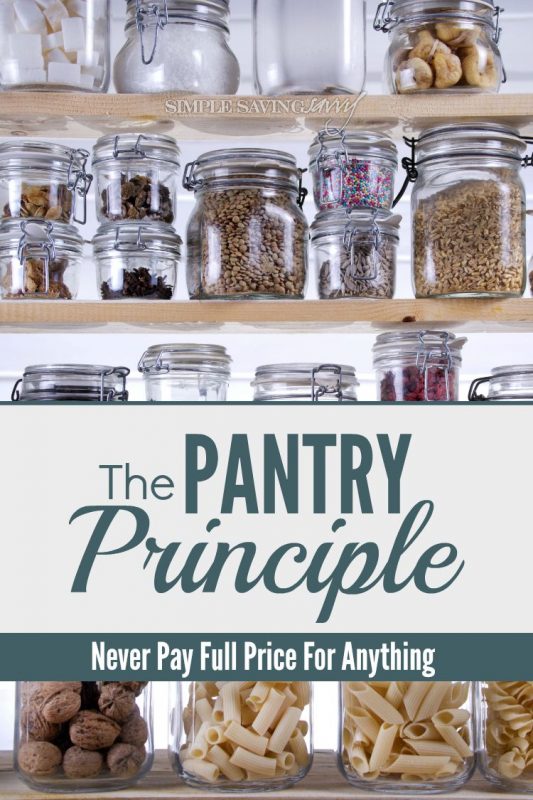I save my family thousands of dollars per year by using the pantry principle, which is nothing more than a balanced approach to the infamous stockpiling methods of professional couponers.
The mission behind stockpiling is to never pay full price for anything. Instead, the goal is to stock up when an item is at its lowest price so you never pay full price for the products you use on a regular basis.
Unfortunately, the word “stockpiling” often brings to mind images of extreme unbalance like garages lined with shelving and stocked with more deodorant and mustard than any normal person could use in a lifetime or a lunatic coupon clipper clearing entire inventories of sale items from store shelves.
The Pantry Principle Defined
In spite of this negative perspective, moderate stockpiling, or what I call “the pantry principle” is a very wise practice. The pantry principle, simply defined, is stocking up your pantry with what you need at the lowest price you can find.
I try very hard not to pay full price for anything or to spend impulsively. There are times when I do buy something impulsively or when I misjudge my stock and end up paying the full amount for an item. However, a large amount of the grocery items, personal care and household products my family uses is purchased at more than 50% off.
Because I stock up on items when they are on sale (provided my budget allows) and/or I have a coupon, my shopping habits often seem strange to others. If I can get BBQ sauce for free, I’ll purchase as many as I have coupons for. If I can get cereal for less than $1 a box, I buy as my budget will allow.
When I create my weekly meal plan, I first check to see what my pantry and freezer already hold. The majority of the menu is planned around these ingredients.
Then I use the weekly sales fliers along with my coupons to determine what I want or need to stock up on within my budget. I also add in any specific ingredients I need to round out a recipe or meal I’ve planned from the freezer and pantry ingredients.
For many people who are used to buying only what groceries they’ll use in the next week, the concept of buying ahead can be overwhelming. However, I highly recommend you at least give it a try as it can save you a great deal of money.
How to Use the Pantry Principle
You do not have to go out tomorrow and spend $500 trying to stock your pantry.
Instead, designate a small percentage of your grocery budget each week to buying extra of those heavily-discounted items which you know you will use sometime in the next few months.
For instance, if your family eats peanut butter and it goes on sale for $1.50 per jar, that’s a savings of about $1 – $1.50 per jar. So instead of buying one, you would buy three or five (depending on how quickly your family goes through it).
Instead of buying it at full price again in the next few weeks, you’ve got some on hand and can wait until it goes on sale again.
Slowly start to build up a stockpile of items you regularly use as you find them discounted with a sale and/or coupon. Over time, your stockpile will grow until you come to a point where you can begin to pretty much only buy items at rock-bottom prices, in addition to produce and perishable items.
After practicing the pantry principle for about five years, most of the items I shop for each week are stockpile items.
Start practicing the pantry principle and you will see a significant decrease in your grocery and household budget.
Wondering how you determine the lowest price? You might also be interested in:
